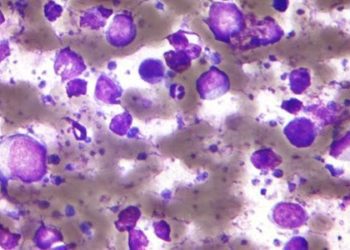Idecabtagene vicleucel showed a response in pre-treated multiple myeloma
1. Idecabtagene vicleucel treatment showed substantial antitumor activity in the majority of pre-treated patients with refractory and relapsed myeloma.
2. Almost all patients had grade 3 or 4 adverse events, which included myelosuppression and cytokine release syndrome.
Evidence Rating Level: 2 (Good)
Study Rundown: Multiple myeloma patients who progressed on proteasome inhibitors, immunomodulatory drugs, and anti-CD38 antibodies have few treatment options. Additionally, the median progression-free survival for these patients is usually in the range of three to four months. As such, this trial evaluated the response and safety of a B-cell maturation antigen-directed CAR T cell, called idecabtagene vicleucel (ide-cel) in heavily pre-treated multiple myeloma patients. The majority of patients had a response to treatment, and progression-free survival (PFS) was 8.8 months. Nearly all patients experienced grade 3 or 4 adverse events primarily consisting of myelosuppression and cytokine release syndrome. The study was limited by the short-term follow-up period, thereby, the study was unable to determine the long-term effects of the treatment. Nonetheless, this study’s results are significant, and its findings highlight evidence of promising CAR-T cell therapy for the treatment of relapsed multiple myeloma.
Click here to read the study in the NEJM
Relevant Reading: Anti-BCMA CAR T-Cell Therapy bb2121 in Relapsed or Refractory Multiple Myeloma
In-Depth [prospective cohort]: This phase 2 trial enrolled 140 patients. The study inclusion criteria were patients with relapsed and refractory multiple myeloma and the prior exposure to a proteasome inhibitor, an immunomodulatory drug, and an anti-CD38 antibody. Patients that were below the age of 18 years of age were excluded from the trial. The primary outcome was the overall response to treatment – either a partial response or better. 128 patients received the ide-cel treatment, and the median follow-up was 13.3 months. Overall, 94 of 128 patients (73%) had a response, and 42 of 128 patients (33%) had complete responses or better. Minimal residual disease (MRD)-negative status was confirmed in 33 of the 128 patients (26%). Median PFS was 8.8 months (95% confidence interval, 5.6 to 11.6 months). Additionally, the safety profile of the treatment showed common toxic effects such as neutropenia (117 of 128 patients, 91%), anemia (107 of 128 patients, 84%), and thrombocytopenia (81 of 128 patients, 63%). Furthermore, cytokine release syndrome occurred in 84% of patients (107 of 128 patients), of which 5% of the total patients had grade 3 or higher adverse events. Overall, this study indicated the idecabtagene vicleucel treatment was effective for refractory multiple myeloma; however, most patients experienced serious adverse events.
Image: PD
©2021 2 Minute Medicine, Inc. All rights reserved. No works may be reproduced without expressed written consent from 2 Minute Medicine, Inc. Inquire about licensing here. No article should be construed as medical advice and is not intended as such by the authors or by 2 Minute Medicine, Inc.







